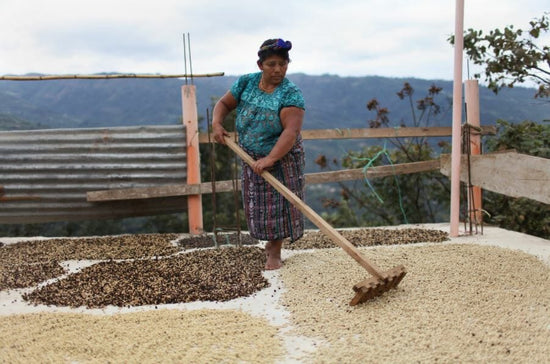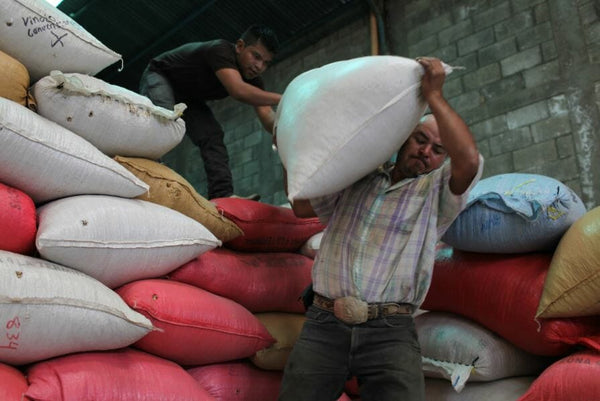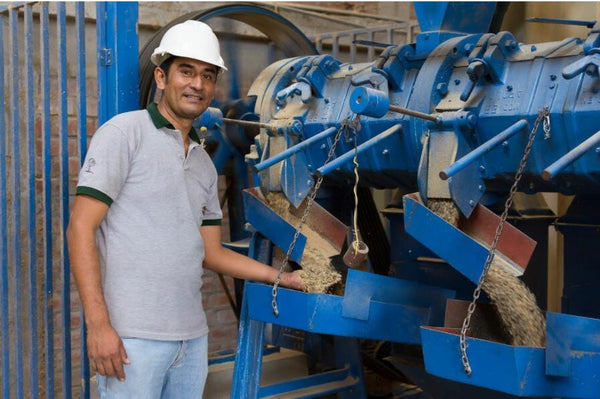Fair Trade Coffee Month

October is Fair Trade Month, which raises awareness and gives voice to the Fair Trade movement and its impact on the global economy. In 2023, that impact is more important than ever. The global pandemic has had lasting effects and hit coffee farmers and producers particularly hard, adding new challenges to the abject poverty and climate change many producers were already facing. As a result, the future of coffee farming as a way of life has become more uncertain; however, this future is not set in stone—giving us the power to help affect change. In recognition of Fair Trade Month, we’ve partnered with Fair Trade USA®️ and Equator Coffee to learn more about Equator's fair trade partnership with the Coordinadora de Organizaciones de Desarrollo de Concepción Huista (better known as CODECH) in Guatemala.
What is Fair Trade Coffee?
Fair Trade USA®️ is a nonprofit third-party certification organization whose mission is to improve the lives of producers by standardizing practices at every level of the coffee supply chain. The Fair Trade certification helps improve health, safety, fair wages, and adequate housing for workers. It is the only mainstream model that guarantees a minimum price to help coffee producers through hard times like these. What makes the Fair Trade certification a step in the right direction for the coffee industry is there is more transparency and accountability about the final product and quality of the product you’re getting, reinforced by rigorous standards that specifically address known issues in the coffee industry. It’s quite simple: better working conditions and increased wages equals better quality coffee.
Certification against Standards
Fair Trade standards require every level of the supply chain to comply with a set level of requirements audited by third-party organizations. For farmers, that means social and economic components that guarantee safe working conditions and workers' rights that ensure cooperative members have a voice in governance and lay out ground rules for terms of trade. In addition, environmental standards ensure farms are sustainably managed.

Santiago Lopez Diaz hands a 100-pound sack of coffee to Manuel Castillo. Both are Popti Mayan coffee growers and members of CODECH. c/o Fair Trade USA®️
Fair Trade Minimum Price
Fair Trade USA®️ sets a minimum price (FTMP) across commodities that face the most volatile pricing shifts, including coffee. Coffee sold through the C market (commodity market) is often sold for far less than it takes to produce, meaning that in years like 2018, where C market pricing for coffee was at a 12-year low, many farmers lost money. The issues facing people at every level of the coffee industry are intersectional spanning race, ethnicity, gender, sex, and class. Conditions were so dire in parts of Central America, like Honduras, that many coffee farmers were forced to flee their countries and come to the US in the 2018 migrant caravan to seek asylum due to the economic crisis. Regulated minimums are just one tool to help to protect farmers from price shocks that regularly hit and plan for the future with stability.
Regulated minimums help to protect farmers from price shocks that regularly hit and plan for the future with stability. 2023 sees more Fair Trade improvements; for instance, on March 30, 2023, Fairtrade International (FLO) announced it will raise its coffee minimum price and organic differential, effective August 1, 2023. 
Market price fluctuations of commodity coffee and the Fair Trade minimum price c/o Fair Trade USA®️
Community Development Funds
On top of the Fair Trade minimum price, farmer co-ops earn an additional specified amount by volume that gets set aside into an investment fund for their community. Members of the cooperative who earned the additional funds gather and democratically decide how to invest these funds depending on the local needs of their communities—depending on the year, that may mean investments in infrastructure, quality improvement initiatives, or social projects. Other years may mean education for the workers' children, funeral services, or vital healthcare screenings. While the Fair Trade minimum price is not perfect, ideally it will continue to increase to meet community needs.

Alex Guerrero, Equipment Manager, at Bagua Grande's dry processing facilities in Peru. Fair Trade Community Development Funds partially financed Bagua Grande's dry processing facilities. These facilities are a critical resource not only for Bagua Grande, who can dry mill their members' coffee here but as an additional source of revenue as other cooperatives in the region can pay to dry mill their coffee here as well. c/o Fair Trade USA
Fair Trade™ or Direct Trade?
We don’t take sides in the Fair Trade vs. Direct Trade debate at Mistobox and Clive Coffee—we can live in a world that has both. Sustainability is not clean and tidy. Both invest in the farmer, promote sustainability and safety, and ensure living wages for producers. With that said, there are crucial differences between the two.
With Fair Trade standards, there is 3rd party regulation, and we will know, through the official seal, that rigorous standards were adhered to, and the trade agreement must meet prescriptive benchmarks. On the other hand, with Direct Trade coffee, there is no mainstream standardization for what that trade relationship entails. Each direct trade partnership is crafted between the farmer and the roaster, sometimes leading to robust partnerships that exceed the Fair Trade™ standards considerably, as with Onyx Coffee Labs, which pays their producing partners up to 6 times more than the Fair Trade minimum. While incredible, that's not the case with every direct trade claim. It's essential to research each company's standards when defining the Direct Trade relationship.
Most importantly, Fair Trade Certification can be expensive and time-consuming, and some cooperatives simply can’t afford it. Since there is no certification process with direct trade, there can be fewer barriers to entry for producers. Fair Trade is also limited to only those farmers who belong to cooperatives and large estates, leaving out small-scale individual farmers. While that is unfortunate, there is no denying that Fair Trade has a significant impact on the producers that partner with them. In 2019 alone, $37 million in Fair Trade premiums were invested back into coffee communities.

Fair Trade Coffee in Practice: CODECH and Equator Coffee
CODECH (short for Coordinadora de Organizaciones de Desarrollo Concepción Huista) is a coffee organization in the mountainous highlands of western Guatemala that unites seven different coffee cooperatives. Founded in 1998, this 500-person organization is 30% female and supports local smallholder farmers to produce and market their coffee. Over the past decade, yields on the coffee farms surrounding Concepción Huista have dramatically decreased because of climate change. Still, training and systematic renovations initiated by CODECH six years ago are paying off. These programs drive the group’s recent growth as non-members witness the impact on production and quality. Using community development funds received from the Fair Trade premiums, CODECH has been able to invest in internal inspections for members to implement best agricultural practices, meet organic certification standards, and improve quality control.

Angela Camposeco, a Popti Mayan coffee grower and CODECH member, rakes coffee beans at home to speed up sun-drying. Angela and her husband have been affiliated with CODECH for years and have eight children. c/o Fair Trade USA®️
Several of Mistobox's roasters are sourced from CODECH, including Evans Brothers Coffee Roasters, which does a lovely medium-dark roast. However, Equator Coffee from San Rafael, CA, has worked with CODECH for several years through Fair Trade Certified™ partnerships. The Guatemala Concepción Huista Fair Trade Organic from Equator is a washed, light roast grown and processed by CODECH co-op member Marcos de Marcos Gaspar. This coffee gives us Sweet and cohesive guava, créme brulee, and lemon flavors. Marcos consistently places well in CODECH’s annual coffee quality competition.
You have the Power to Make Smart Choices
As you can see it’s not a cut-and-dry answer. If you are willing to do the work of delving into the specific relationships—Direct Trade can be an excellent way to go with higher potential upsides for producers. If you want to support a larger swath of farmers belonging to cooperatives and know precisely what you're getting every time—Fair Trade is a great option. We like to mix and match at Mistobox, so we carry both. While only a portion of the coffees MistoBox roasters offer have certifications, we are confident that all of the coffees we offer meet or exceed all ethical standards for buying coffees and ensuring fair compensation to the producers.
Ready to try some of the best Fair Trade coffees? Subscribe to Misto Box's Fair Trade coffee subscription and discover the best Fair Trade coffee being roasted today.